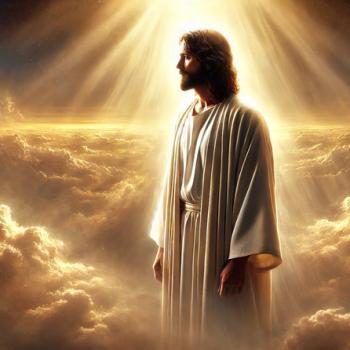In the Book of Mormon, Alma 18-19 tells of the conversion of an unbelieving king, King Lamoni. The missionary, Ammon, preaches their shared history, from Adam to the division between Ammon's and Lamoni's people, and he adds to that history "the plan of redemption which was prepared from the foundation of the world" and "the coming of Christ" (Alma 18:36-39). Lamoni is overcome in response to Ammon's sermon, falling unconscious for two days and nights. Recovering he says "Behold, I have seen my Redeemer; and he shall come forth, and be born of a woman, and he shall redeem all mankind who believe on his name" (Alma 19:13).
An earlier Book of Mormon prophet, Nephi, also tells of the coming of the Redeemer. Having asked to see and understand a vision his father had, an angel appears to Nephi in a vision. In that vision Nephi sees a tree and asks to know its meaning. The response is a vision of Jerusalem and Nazareth, in which Nephi sees "a virgin, most beautiful and fair above all other virgins" (1 Nephi 11:15). With that the angel asks him, "Knowest thou the condescension of God?" (1 Nephi 11:16), and when Nephi confesses that though he knows that God loves his children, he does not know what the angel means, he receives another vision: "I looked and beheld the virgin again, bearing a child in her arms" (1 Nephi 11:20). That child, he learns, is our Redeemer (1 Nephi 11:26-27).
Yet another Book of Mormon prophet, Alma, preaches a sermon telling those listening that the kingdom of heaven is at hand (Alma 7:9). The time will soon come, he tells them, when the Son of God will come to the earth, born of Mary (Alma 7:10).
Christians prepare to celebrate that coming of the Son of God within a few days. As we do, we should take time to honor his mother, Mary, and to remember explicitly that he was born of a woman. For Christians, any temptation to assume male superiority of some kind ought to be undercut by that birth. We know that, historically, it has not undercut the temptation. Have Christians been, or are they now, any less likely to oppress women than others have been and are? Perhaps, but even if so, not dramatically so. All the more reason to explicitly recall that the Redeemer came to us through a woman, the first thing that these three prophets mention when they speak of him; given what we know of the dominant culture at the time, perhaps they mention it because it was such a surprise.
As we celebrate Jesus' birth, we ought also to remember that he came to redeem; the baby in the manger is the Redeemer of the world. He was born into the world in the same way that we were. As Alma reminds us, he suffered pains and afflictions of every kind, including the pain of death (Alma 7:11-12). Though God, he came into the world as we do, and he left it as we do. And he did so "that he might take upon him the sins of his people, that he might blot out their transgressions according to the power of his deliverance" (Alma 7:13).
I'm struck by the conjunction of these constellations of ideas, being born of woman and redemption. They are not conjoined in opposition, but in parallel. Christian ritual and imagery maintain that parallel, speaking of conversion as rebirth and imitating birth in rituals (in Mormon terms, ordinances) such as baptism. Another Mormon scripture, the Pearl of Great Price, is explicit about their connection: "Inasmuch as ye were born into the world by water, and blood, and the spirit, which I have made, and so became of dust a living soul, even so ye must be born again into the kingdom of heaven, of water, and of the Spirit, and be cleansed by blood, even the blood of mine Only Begotten" (Moses 6:59). The Redeemer is born of a woman and makes himself womanly in making our rebirth possible. Would that we would all strive to be womanly.
12/23/2010 5:00:00 AM





